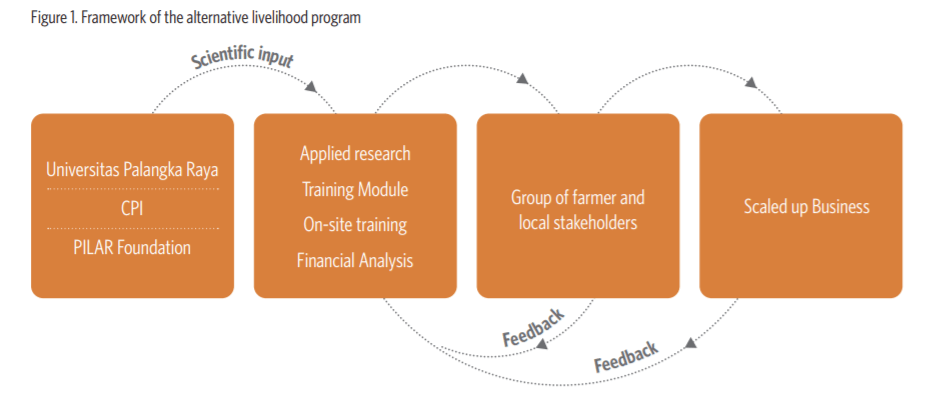The oil palm sector is highly important in Central Kalimantan. It contributes nearly 21% to the province’s gross domestic regional product (GDRP) and employs nearly half of the province’s working population. Currently, smallholders own around 13% of the total oil palm plantations in the province and this will continue to expand: The Central Kalimantan government has indicated a mandate that smallholders manage 20% of plantations by 2020. However, smallholders are exposed to various risks that can affect their earnings.
Climate Policy Initiative (CPI), the University of Palangka Raya, and PILAR Foundation have developed an alternative livelihood research program that will not only help smallholder farmers secure alternative sources of income, but will also be scaled to businesses with the means to further grow the rural economy. This brief focuses on the business model aspects of two alternative livelihoods – cattle feed and fisheries – with application specifically to the East Kotawaringin and Katingan districts of Central Kalimantan.
We find that both cattle feed and fisheries are feasible in conjunction with oil palm and offer high potential for increased, diversified incomes for smallholders. Cattle cultivation offers an attractive net profit of approximately IDR 2 million per month, which is close to the minimum provincial wage of IDR 2.4 million per month (Central Kalimantan Governor Decree No. 30/ 2017). However, cattle business requires high upfront investments, therefore, access to financing is necessary to maximize the profit obtained from the intended business size. It also requires more maintenance. Fish cultivation, on the other hand, requires relatively lower investment with less maintenance work than cattle. Tilapia, for example, only needs IDR 3.8 million investment for potential net profit of IDR 7.4 million per year within three harvest periods. These business models can both be scaled up in Central Kalimantan and beyond.
About this study: Applied research for rural economy improvement

Researchers from the University of Palangka Raya (UPR) have assessed alternate livelihoods for farmers which would optimize land use and oil palm resources, increase their income, and, in turn, develop the local economy.
There are two alternative livelihood projects that have been developed by UPR’s researchers: ‘Utilization of Waste from Oil Palm Plantation for Cattle Feed’ and ‘Fish Cultivation in Oil Palm Plantation.’
The projects were piloted on a demonstration plot in Henda Village, near the province’s capital, Palangka Raya. Once the projects were deemed successful, the researchers developed alternative livelihood guidelines and training modules for smallholder farmers, which provided background information and simple steps that could be easily followed and replicated by smallholder farmers in their plantations. Training for farmers and extension service officers was then conducted by UPR researchers and PILAR Foundation. It was a two-way learning exercise with farmers providing feedback on the applicability of the alternative livelihoods being taught.
In this brief, CPI provides business analysis for both projects to help farmers understand investment needs and cash flow analysis to scale up these activities.

